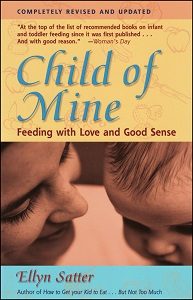

Family Meals Focus
The Ellyn Satter Institute Newsletter
Breastfeeding hullabaloo
by Ellyn Satter, Registered Dietitian and Family Therapist
Breastfeeding advocacy may leave you feeling pressured to breastfeed and distraught if you can’t or don’t want to do it. In carefully reading the literature, I have gathered that formula is good for babies; breastfeeding is better. That would be breastfeeding, not necessarily breast milk. You can love your baby and let him be healthy with either breastfeeding or formula-feeding. Babies grow up thin, fat, or in-between either way. Whether you breastfeed or formula feed, you are entitled to support from your health care providers and help establishing a positive feeding relationship with your baby.
The case against breastfeeding
In her Atlantic article, The Case Against Breastfeeding, well-known writer Hanna Rosin says, ”In certain overachieving circles, breast-feeding is no longer a choice – it’s a no-exceptions requirement, the ultimate badge of responsible parenting. Yet the actual health benefits of breast-feeding are surprisingly thin, far thinner than most popular literature indicates.” Rosin first flashes her breastfeeding-mother credentials, then goes on to say that, ”given what we know so far, it seems reasonable to put breast-feeding’s health benefits on the plus side of the ledger and other things – modesty, independence, career, sanity – on the minus side, and then tally them up and make a decision.”
Lactofanatacism
Whether the infant ingests formula or breast milk, the bottom line is helping parents establish a positive feeding relationship with their baby.
Others weighed in to support Rosin’s point of view. Consider Dr. Esther’s blog Breastfeeding Advocacy versus Lactofanaticism. As seems mandatory in this debate, MD Esther first shows her credentials as a breastfeeding mother and as a physician who supports breastfeeding. She states her carefully researched conclusion that ”As health measures go, breastfeeding is effective, but only moderately so,” then gets to the heart of the matter: ”I believe in informing women and trusting them to make their own decisions, according to their own priorities and their own unique circumstances. I hate lactofanaticism [her word] it makes my job that much harder. It may initially guilt or scare women into breastfeeding, but once they run into the cold, hard wall of reality, false ‘campaign promises’ make it that much harder to persevere.”
Breast feeding or breast pump?
After flashing her breastfeeding credentials, Judith Werner wonders in her New York Times blog Domestic Disturbances whether what’s key about breastfeeding is the breast milk or the act of breastfeeding. She decries the breast pump, Rosin’s ”least favorite thing I ever did in my whole life.” ”The grotesque ritual carried out behind closed office doors nationwide by beleaguered working mothers who are fully ‘committed’ (as the lactation consultants put it) to the goal of long-term, exclusive breast-feeding.”
WIC – The Special Supplemental Nutrition Program for Women, Infants, and Children
WIC practitioners are advocates who strongly encourage breastfeeding. The National WIC Association’s Breastfeeding Committee partnered with sister organizations of the United States Breastfeeding Committee in a letter labelling Rosin’s article ”highly problematic.” After arguing that breast is best, the letter concludes, ”Ensuring that all women and families have the clear, balanced information about infant feeding choices to make informed decisions, and providing support through our health care system, workplace, and society, will ensure that all children can begin life in the healthiest way possible.”
I encourage informed decision-making
Which brings us to, well, me. My credential: I breastfed three infants and have 11 breastfed grandchildren. In pro-breastfeeding committees and agencies, I am considered anti-breastfeeding. My books and handouts indicate that breastfeeding has a modest health benefits over formula feeding. Many readers call my Child of Mine breastfeeding chapter to be the best. In spite of it all, in pro-breastfeeding committees and agencies, I am considered anti-breastfeeding. Why? Because I support informed decision-making about breastfeeding and formula. To my sorrow, I have found that breastfeeding enthusiasts are only satisfied with breastfeeding advocacy. To my further sorrow, the needs of formula-feeding parents and their infants are often overlooked. Almost without exception, breastfeeding parents get education and support. Formula-feeding parents may get subtle or right-out-loud messages that they are giving their baby inadequate care.
The priority: A positive feeding relationship
You can love your baby and do a good job with either breastfeeding or formula-feeding. If you breastfeed, it must be your decision. Here is how to decide.
- Breastfeed if you feel good about it. Don’t let anybody else talk you into it.
- If you can take it or leave it, take it! It is that important!
- Try breastfeeding at first to help you decide.
- If you like it, or if it is just okay, breastfeed.
- If you don’t like it, don’t breastfeed and don’t feel bad about it.
Explore
Parents say the “Breastfeeding your baby” chapter in Ellyn Satter’s Child of Mine: Feeding with Love and Good Sense. is the best they have read. “Formula-feeding your baby” is just as good!

